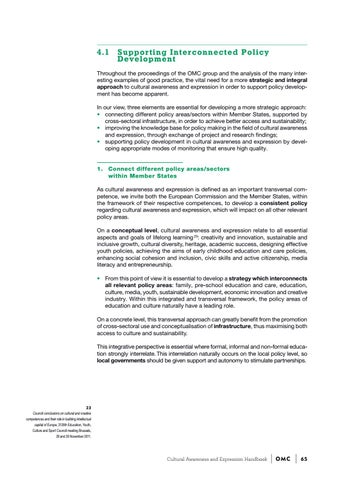4. 1 Su p p o rti n g I n te r c o n n e c te d Po li c y De v e l o pm e n t Throughout the proceedings of the OMC group and the analysis of the many interesting examples of good practice, the vital need for a more strategic and integral approach to cultural awareness and expression in order to support policy development has become apparent. In our view, three elements are essential for developing a more strategic approach: • connecting different policy areas/sectors within Member States, supported by cross-sectoral infrastructure, in order to achieve better access and sustainability; • improving the knowledge base for policy making in the field of cultural awareness and expression, through exchange of project and research findings; • supporting policy development in cultural awareness and expression by developing appropriate modes of monitoring that ensure high quality. 1. Connect different policy areas/sectors within Member States As cultural awareness and expression is defined as an important transversal competence, we invite both the European Commission and the Member States, within the framework of their respective competences, to develop a consistent policy regarding cultural awareness and expression, which will impact on all other relevant policy areas. On a conceptual level, cultural awareness and expression relate to all essential aspects and goals of lifelong learning 23: creativity and innovation, sustainable and inclusive growth, cultural diversity, heritage, academic success, designing effective youth policies, achieving the aims of early childhood education and care policies, enhancing social cohesion and inclusion, civic skills and active citizenship, media literacy and entrepreneurship. • F rom this point of view it is essential to develop a strategy which interconnects all relevant policy areas: family, pre-school education and care, education, culture, media, youth, sustainable development, economic innovation and creative industry. Within this integrated and transversal framework, the policy areas of education and culture naturally have a leading role. On a concrete level, this transversal approach can greatly benefit from the promotion of cross-sectoral use and conceptualisation of infrastructure, thus maximising both access to culture and sustainability. This integrative perspective is essential where formal, informal and non-formal education strongly interrelate. This interrelation naturally occurs on the local policy level, so local governments should be given support and autonomy to stimulate partnerships.
23 Council conclusions on cultural and creative competences and their role in building intellectual capital of Europe, 3128th Education, Youth, Culture and Sport Council meeting Brussels, 28 and 29 November 2011.
Cultural Awareness and Expression Handbook
OMC
65
